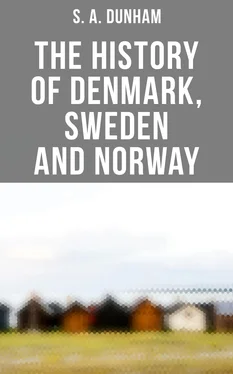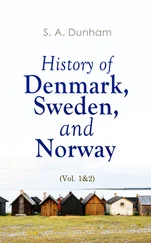S. A. Dunham - The History of Denmark, Sweden and Norway
Здесь есть возможность читать онлайн «S. A. Dunham - The History of Denmark, Sweden and Norway» — ознакомительный отрывок электронной книги совершенно бесплатно, а после прочтения отрывка купить полную версию. В некоторых случаях можно слушать аудио, скачать через торрент в формате fb2 и присутствует краткое содержание. Жанр: unrecognised, на английском языке. Описание произведения, (предисловие) а так же отзывы посетителей доступны на портале библиотеки ЛибКат.
- Название:The History of Denmark, Sweden and Norway
- Автор:
- Жанр:
- Год:неизвестен
- ISBN:нет данных
- Рейтинг книги:4 / 5. Голосов: 1
-
Избранное:Добавить в избранное
- Отзывы:
-
Ваша оценка:
- 80
- 1
- 2
- 3
- 4
- 5
The History of Denmark, Sweden and Norway: краткое содержание, описание и аннотация
Предлагаем к чтению аннотацию, описание, краткое содержание или предисловие (зависит от того, что написал сам автор книги «The History of Denmark, Sweden and Norway»). Если вы не нашли необходимую информацию о книге — напишите в комментариях, мы постараемся отыскать её.
The Pagan Age:
Denmark (B.C. 40 to A.D. 1014)
Sweden (A.C. 70 to A.D. 1001)
Norway (about A.C. 70 to A.D. 1030)
Maritime Expeditions of the Northmen During the Pagan Times:
In England, France, and Ireland
Maritime Expeditions of the Northmen During the Pagan Times:
In the Orkneys, the Hebrides, Iceland, Greenland, North America, Russia, etc.
Cosmogony and Religion of Scandinavia
Introduction of Christianity Into Denmark and Sweden
The Middle Age:
Denmark (1014-1387)
Norway (1030-1387)
Sweden (1001-1389)
The History of Denmark, Sweden and Norway — читать онлайн ознакомительный отрывок
Ниже представлен текст книги, разбитый по страницам. Система сохранения места последней прочитанной страницы, позволяет с удобством читать онлайн бесплатно книгу «The History of Denmark, Sweden and Norway», без необходимости каждый раз заново искать на чём Вы остановились. Поставьте закладку, и сможете в любой момент перейти на страницу, на которой закончили чтение.
Интервал:
Закладка:
Whatever portion of the marvellous may exist in such stories as the preceding, no doubt can be entertained of their being founded in truth. But if they were not, they could not be wholly omitted, unless we were resolved to shut our eyes to the national manners. Of such manners—the best part of history—they are the best, we may add, the only, mirrors. Nor is the state of human opinion, as modified by education, climate, and habits, a less interesting object of contemplation. For this reason, and because of the dearth of genuine events during this ante-historic period, we have drawn, and for some pages must continue to draw, more largely on the traditionary lore of Scandinavia than we should do were those events more abundant and better established. Now for another legend, wilder than any of the preceding. Gorm I. , king of Denmark, a prince not mentioned in the list of Suhm, yet who undoubtedly reigned in Jutland, was exceedingly fond of exploring the secrets of nature, of visiting everything wonderful, of enlarging his knowledge. From the inhabitants of Thule he had heard of the wondrous seat of Geruth, one of the gigantic magicians who, in ancient times, had been opposed to the gods of Asheim; but the place was considered as all but inaccessible to mortals, as surrounded with dangers which would make the boldest quail. But dangers were just the things which most excited the enterprise of Gorm, and he resolved to sail in quest of the mysterious place. He was to follow the course of the mighty ocean, which, like a circle, surrounded the earth [82]; to leave the sun and the stars behind; to penetrate into ancient chaos—into regions deprived of light, and beset with terrors of every kind. Three hundred men, in three vessels, agreed to accompany their king; and all were to be under the guidance of Thorkil, who had already performed the voyage. Thorkil lost no time in giving additional strength to the vessels, in covering them with thick hides of leather, so as to prevent the ingress of the waters, and in filling them with suitable provisions. The expedition, and after many, many days, arrived off the coast of Halogia [83], or the country of the Lapps; on they then sailed, until their provisions began to fail, the storm to rage, the sea to dash its deafening billows against the rocks. A nimble youth was commanded to ascend the mast, and see whether land was nigh; he shouted out that an island, of abrupt, precipitous access, lay within sight. The delighted crew steered for the place, moored their vessels, and ascended the cliffs. Thorkil warned them not to seize, from the numerous herds of cattle now visible, more than was sufficient to satisfy their present hunger; if they did, the avenging deities of the place would prevent their return home. But when the famishing men perceived how easily the unsuspecting beasts were taken, they forgot the warning, and killed enough to load their ships. The night following, as they lay in their beds on board they were terrified with strange noises, and still more with the appearance of monstrous forms running along the shore. One of these, more gigantic than the rest, walked on the sea, with a huge club in his hand, and cried aloud that they could not sail until they had expiated the injury done to the sacred herd, by delivering one man from each vessel. Thorkil, perceiving that there was no escape, and preferring the safety of the many to that of the few, commanded the lots to be drawn, and the victims to be delivered. The wind now became favourable, and the vessels proceeded to the farther Biarmia. This was a region of eternal cold, covered with deep snows, and with pathless forests, destitute of fertility, and abounding with strange beasts; here were many rivers, pouring along their waters with ceaseless noise, owing to the rocky impediments in their course. To this coast Thorkil directed the prows of the vessels, assuring his companions that they were now come to the place which immediately led to the abode of Geruth. He warned them not to speak with the inhabitants, but to leave that office to him, who was acquainted with the customs of the place. Towards twilight, a mighty giant approached, and saluted the sailors by name; this was Guthmund, the brother of Geruth, the protector of strangers. They gazed, admired, and were silent. When asked by the giant the reason of their silence, Thorkil replied that they were unacquainted with his speech. Guthmund received them into his chariots, and proceeded with them towards his palace. A golden bridge lay within sight, and some were inclined to pass over it. “If you do,” said Thorkil, “you will repent: this river, so full of monstrous beings, separates the human from other natures, and beyond it is no footing for man.” They soon came to the house of their host, and here it was doubly necessary for Thorkil to repeat his warnings: he assured them, they were literally surrounded by destruction. They must not eat of the food placed before them, but eat what they had brought with them, and seat themselves at a distance from the natives. They must equally shun the embraces of the women; for Guthmund had twelve lovely daughters, all ministers of the table, and all frail enough. If they yielded to any of these temptations, they would instantly lose the remembrance of the past, and would pass the remainder of their days with herds of monstrous beasts. The terrified strangers observed his directions; but Guthmund was offended with them for despising his hospitality: he was particularly so with king Gorm. But Thorkil had a ready excuse. Strange food, the latter observed, did not agree with many persons, and was frequently the cause of disease; it was so with the king, who was obliged to live on certain kinds of food, which he could only be sure of finding in his own kitchen: hence the host should not be offended with that which implied no want of respect to himself, but a prudent attention to one’s own health. This temptation having failed, the giant offered his daughters to the king; and to the rest, other maidens of his household. This was indeed a temptation. Thorkil, in a low voice, repeated his warning; but four of the number yielded, and were immediately deprived of memory, and, in a great degree, of reason. Now for a third temptation. Guthmund had a delightful garden, the fruits of which were unequalled: Thorkil prevailed on his men to refuse the offer, and accompanied the refusal with much feigned politeness. Seeing that he could have no more than the four victims, the giant transported them over the river. [84]
Beyond this stream the adventurers perceived, at no great distance, a dark, unfrequented city, resembling a cloud of smoke. On high poles, grinned mortal heads, dissevered from their bodies; and below the entrance, which could only be reached by ladders, yelled hideous dogs, ready to devour the travellers. The entrails of a beast, cast before them by Thorkil, satisfied their howls, and the whole party ascended to the gate. Within, the whole town was possessed by dark larvæ, whose horrid noise, as they hovered about, were ended by the frightfulness of their shapes: all within was putrid, intolerable to the eye, and still more so to the breath. Onward the adventurers went, and entered a stony cavern which, according to tradition, had been the palace of Geruth. The horrible gloom within made them pause on the threshold, but Thorkil encouraged them to proceed; at the same time, he warned them to beware of taking or touching anything, however inviting to the eye; to restrain their minds from avarice as from fear; to desire nothing, to dread nothing; for if they laid a covetous hand on any desirable object, that hand would instantly become immoveable, and the whole body as if it were inextricably fettered. Their guide then directed them to enter in fours: Broder and Buchi led the way; Thorkil and the king followed; the rest, in the same order, formed the main body. The interior of the palace was old and unfrequented; a dark cloud filled it; and it abounded with everything offensive to the senses. The pillars were encrusted with ancient mould; the walls teemed with loathsome slime; the roof was formed of spears; the floor was covered with serpents, and filth of every kind; so that the strangers were not a little terrified. Above all, their noses were offended with the fœtid smell. Farther on were iron seats, filled with lifeless images of monstrous forms; and these were in the recesses of the hall, separated from it by leaden grates; and at the entrances were horrid porters, some howling, and shaking their maces; some, with their goat-like bodies, exhibiting an unseemly sport. Before the adventurers proceeded farther into the interior, Thorkil was careful to repeat his warning—not to stretch forth their hands to the treasures they would see. Passing by a huge fragment of a rock, they perceived an aged man reclining, with wounded body, on the sharp rocky peaks above them. Beside him were three females, their bodies covered with tumors, and, as if unable to sit, reclined on the same couch. Who and what were these? Thorkil, who was well versed in such matters, informed his companions that the god Thor, offended by the insolence of Geruth, had driven his bolt through the heart of the giant; that the awful instrument had penetrated into and riven the mountain; that the females had been touched by it; and though their bodies were unbroken, they were suffering the punishment due to those who insulted the god. Proceeding forward, they perceived seven large vessels, surrounded with golden hoops, and filled with precious liquor. Near them was a tooth of an unknown sea monster, the extremities adorned with gold. Close by it was a large horn inlaid with shining gems, and of exquisite workmanship. Near this was a golden bracelet of great weight. The temptation to seize these valuable treasures was too great to be resisted. One man, ignorant that the shining metal concealed destruction beneath it, stretched out his hand to the bracelet. Another, influenced, also, by avarice, laid his eager hands on the horn. A third, emboldened by their example, placed the huge tooth on his shoulders. They soon found how fatally they had been deluded. One of these treasures was immediately transformed into a serpent, which, with venomous tooth, fell upon the robber. The horn became a dragon, which, also, destroyed the spoiler. The tooth became a sword, which found its way to the heart of the bearer. Terrified at this spectacle, even the innocent began to fear that they should suffer with the guilty. Proceeding onwards, a door opened to a smaller recess, but rich in treasures. Here were weapons, too large indeed for the human body, but of inestimable value. Among them was a royal mantle or cloak, with a cap, and a belt of admirable workmanship. At the sight, Thorkil, who had so often advised others, forgot himself. He took the garment in his hand, and the rest, influenced by his example, seized the things which they most coveted. Suddenly the cavern, from its lowest foundations, shook; every thing began to reel; and the women cried aloud that these wicked robbers must no longer be spared. Lifeless as they had appeared, and more like statues than women, they suddenly found a voice, and, rising from their couch, advanced against the strangers. The rest of the monstrous shapes began to howl in a most hideous manner. Broder and Buchi were not unmindful of their former pursuits: with their lances, they resisted the advancing genii; from their bows and their slings they sent the sharp missiles into the dense ranks of the monsters, and dispersed or overthrew them. Yet twenty only of the royal party survived; the rest were torn to pieces by the monsters. In great consternation the survivors issued from the cavern, returned to the river, were ferried over by Guthmund, and entertained in the same manner as before. On this occasion all abstained from the viands and the ladies save Buchi, he who had hitherto been an example of moderation, and to whose valour in the caverned palace so many were indebted for their lives. Having taken one of the ladies to his bed, he was seized with a sudden dizziness, and lost the memory of the past. He did not, however, forget his human feeling; for, anxious to show attention to the guests—now strangers to him—he followed them in one of the chariots of Guthmund, and was for ever engulfed in the waters of the river. The king, pitying the infatuation of his subjects, embarked and returned towards Halogia. But the voyage was again a troubled one: the men were exhausted by the fury of the tempests and by hunger; and Gorm resolved on sacrificing to the gods. While some of his crew called on this, some on that divinity, he invoked the awful Ugarthiloc, by whose favour he obtained a prosperous navigation homewards. [85]
Читать дальшеИнтервал:
Закладка:
Похожие книги на «The History of Denmark, Sweden and Norway»
Представляем Вашему вниманию похожие книги на «The History of Denmark, Sweden and Norway» списком для выбора. Мы отобрали схожую по названию и смыслу литературу в надежде предоставить читателям больше вариантов отыскать новые, интересные, ещё непрочитанные произведения.
Обсуждение, отзывы о книге «The History of Denmark, Sweden and Norway» и просто собственные мнения читателей. Оставьте ваши комментарии, напишите, что Вы думаете о произведении, его смысле или главных героях. Укажите что конкретно понравилось, а что нет, и почему Вы так считаете.












